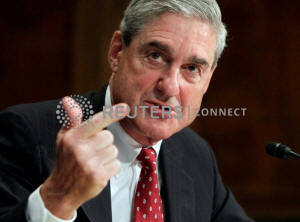|
Mueller navigates dangerous currents in
probing Trump-Russia nexus
 Send a link to a friend
Send a link to a friend
 [March 11, 2019]
By Will Dunham [March 11, 2019]
By Will Dunham
WASHINGTON (Reuters) - Robert Mueller
brought an enviable reputation as the architect of the modern FBI and a
force behind major criminal prosecutions to his job as special counsel
investigating Russia's role in the 2016 U.S. election but has
encountered a relentless campaign by President Donald Trump to discredit
the probe.
Mueller, a longtime Republican, received bipartisan praise when he was
named as special counsel in May 2017 to take over the Russia
investigation after Trump fired FBI Director James Comey, whose agency
had led the probe.
Trump and allies in the Republican Party and conservative media have
sought to disparage Mueller, a 74-year-old former U.S. Marine Corps
officer, and paint the entire Russia investigation as illegitimate and
politically motivated.
Mueller, known for a tough, no-nonsense managerial style, has remained
silent throughout the investigation that threatens Trump's presidency,
letting his team's court filings and indictments do the talking. Several
Trump aides and advisers already have been convicted or pleaded guilty
as a result of the investigation.
The big question is whether Mueller will present evidence of criminal
conduct by the president himself. Such findings could prompt the
Democratic-controlled U.S. House of Representatives to begin the
impeachment process laid out in the Constitution for removing a
president from office for "treason, bribery, or other high crimes and
misdemeanors."

Mueller was appointed director of the Federal Bureau of Investigation by
Republican President George W. Bush in 2001 and, after unanimous Senate
confirmation, started the job a week before the Sept. 11, 2001, attacks
on the United States by al Qaeda militants using hijacked airliners that
killed about 3,000 people.
Democratic President Barack Obama extended Mueller's service. By the
time Mueller left the position in 2013, his tenure was exceeded in
length only by J. Edgar Hoover's 48-year stint.
Mueller was credited with transforming the premier U.S. law enforcement
agency after Congress and an independent government commission found
that the FBI and CIA had failed to share information before the Sept. 11
attacks that could have helped prevent them. Mueller revamped the FBI
into an agency centered on protecting national security in addition to
law enforcement, putting more resources into counterterrorism
investigations and improving cooperation with other U.S. agencies.
He put his career on the line in 2004 when he and Comey, then the deputy
attorney general, threatened to resign when White House officials sought
to reauthorize a domestic eavesdropping program that the Justice
Department had deemed unconstitutional.
The two rushed to a Washington hospital room and prevented top Bush
aides from persuading an ailing Attorney General John Ashcroft,
recovering from gall bladder surgery, to reauthorize the surveillance
program.
Comey succeeded Mueller as FBI director in 2013.
'HIGH IDEALS'
In nominating Mueller in 2001, Bush said, "As a lawyer, prosecutor and
government official, he has shown high ideals, a clear sense of purpose
and a tested devotion to his country."
When Mueller stepped down as FBI chief, Obama called him "one of the
most admired public servants of our time," adding, "I know very few
people in public life who have shown more integrity more consistently
under more pressure than Bob Mueller."
[to top of second column]
|

Robert Mueller, as FBI director, testifies before the U.S. Senate
Judiciary Committee on Capitol Hill in Washington. Sept. 16, 2009.
REUTERS/Yuri Gripas/File Photo

Trump has given a darker assessment, accusing Mueller of pursuing a
"rigged witch hunt" while declining to sit for an interview with the
special counsel's team.
The president in November 2018 wrote on Twitter: "Mueller is a
conflicted prosecutor gone rogue. The Fake News Media builds Bob
Mueller up as a Saint, when in actuality he is the exact opposite.
... Heroes will come of this, and it won't be Mueller and his
terrible Gang of Angry Democrats."
He also has faulted Mueller for not investigating Hillary Clinton,
the defeated 2016 Democratic presidential candidate.
Trump's attacks on Mueller appeal to his conservative political base
as shown when he won cheers denigrating the special counsel during a
March 2 speech to the Conservative Political Action Conference in
Maryland.
After graduating from Princeton University, Mueller served in the
Marine Corps during the Vietnam War, leading a rifle platoon and
receiving commendations including the Bronze Star.
He became a U.S. assistant attorney general in 1991 and was a key
player on high-profile federal prosecutions such as the 1992
convictions of former Panamanian leader Manuel Antonio Noriega and
organized crime boss John Gotti and the investigation into the 1988
bombing of Pan Am Flight 103 over Lockerbie, Scotland.
Mueller's investigation has resulted in charges against 34 people
and three Russian entities. Trump's former campaign chairman Paul
Manafort was convicted on a series of charges and pleaded guilty to
others. Trump's former national security adviser Michael Flynn,
former personal lawyer Michael Cohen and former campaign aides Rick
Gates and George Papadopoulos have entered guilty pleads. Longtime
Trump adviser Roger Stone has pleaded not guilty to charges.
After months of negotiations about a presidential interview with the
special counsel's team, Mueller let Trump give written responses to
questions about whether his campaign conspired with what U.S.
intelligence agencies have described as Russian hacking and
propaganda aimed at causing division in the United States and
boosting Trump's candidacy. Trump provided the written answers in
November 2018.

During his career Mueller had stints in private law practice but
preferred government work. In the 1990s, he left a major law firm to
take a low-level job in the U.S. Attorney's office in the District
of Columbia, specializing in homicide cases at a time when the
capital city had a high murder rate.
"I've always loved investigations," Mueller told Washingtonian
magazine in 2008.
(Reporting by Will Dunham; Editing by Bill Trott)
[© 2019 Thomson Reuters. All rights
reserved.]
Copyright 2019 Reuters. All rights reserved. This material may not be published,
broadcast, rewritten or redistributed.
Thompson Reuters is solely responsible for this content. |